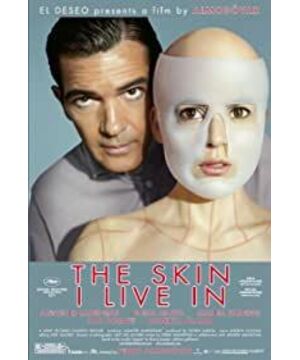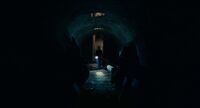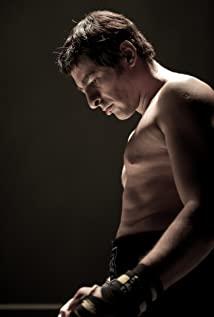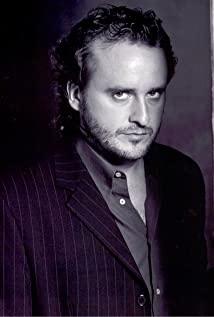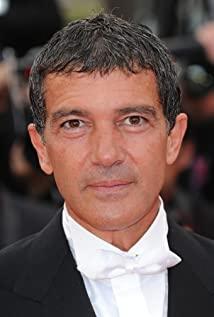The text is transferred from--The unique gender perspective in "The Skin of My Habitat"--Invasion and deletion by Pei Jinwen
James Miller once said that "it is not immoral to be restless with certain peculiar fantasies and wild impulses. Such extreme experiences should be seen as a way to explore man's claustrophobia with the hope of finding a way again. The Dionysian Element." With the disintegration of Franco 's regime, Spain displayed an unprecedented spree of freedom after a political thaw. Deeply influenced by the rebellious spirit of the "Madrid New Wave", Almodóvar is flamboyant and restrained. He is eager to break all social taboos and sing for freedom and humanity. As Paul Obadiah commented, "Almodóvar's films have no taboos. To a large extent, the existing social standards are used to omit, suggest, hide and cover up, while Almodóvar's attitude is candid. and extreme revelations."
Harmony in extreme contradictions should refer to the movie "The Skin of My Residence". Almodóvar has always been a bizarre yet very true story. His story never runs beyond ethics and morality. It should be more felt to watch his films without all the norms and censures of human society. Yet people used to label him as if he was only good at describing lust, women, violence. But these are just one of the symbols he uses to express his moral thinking about human beings. It also involves keywords such as "desire", "incarceration" and "revenge". Some people questioned that it was inappropriate for this film to copy the second old boy in the "revenge trilogy" by Korean director Park Chan-wook. "The Skin of My Dwelling" is adapted from the novel "The Tarantula". Compared with the straightforward and bloody violent aesthetics of "Old Boy", "The Skin of My Dwelling" has more scientific rigor and calmness than Almodóvar's previous works. It's more like a gentle scalpel, not in a hurry to stab people's hearts, but slowly and bit by bit to dissect people's hearts to the audience. In terms of narrative structure and gender temperament, Almodóvar is undoubtedly unique, and it is difficult to imitate and surpass. Yet Almodóvar's films are excellent texts for gender studies. His delicate portrayal of women has gained a high reputation in the industry.
Everything about my mother has swept the major heavyweight awards in the international film industry in 2018. He also has a lot of gay, transgender and kinky content in his films. As a director with homosexual tendencies, he can start from his distinctive gender concept and observe the harm that people often ignore from a certain inherent gender position. He can also retreat from the gender position and only stand on the ontology of human life. Restoring the humanity that human beings should have but is obscured by social norms. The following will explore the unique gender perspective of Almodovar through the specific analysis of "The Skin of My Residence".
The three identities of women
Among many Western male directors, Almodóvar is known for his focus on women. Along with Ingmar Bergman, he was hailed as "the most important European film director who is good at showing the world of women". Most of his films are related to women and many of them are regarded as masterpieces of "women's films". Women in his films have their own unique gendered temperament. While showing their delicate emotionality and the attractiveness of primitive flesh, women also possess similar qualities of perseverance, independence, initiative, and wisdom that are always given to men. These "Almodóvar"-style women from all walks of life and occupations with different pasts blossomed vividly in his films through life and death. There are a total of five people whose biological sex is female in The Skin of My Living The woman is the doctor's wife. Excluding the female clerk who had little influence on the plot, the remaining mothers, wives, and daughters just happened to constitute all the gender roles women played throughout their lives. The following will analyze Almodóvar's presentation of the three identities of women and the gender thinking given to them.
1. The subject of multiple meanings of mothers
Someone once asked Almodóvar "why do women in movies always have a lot of power, they always face huge difficulties, but they always get out of it" Almodóvar replied, "I think it comes from My admiration for my mother. I adore my mother. I used to support the family by myself, but no matter how difficult the situation was, my mother could handle everything. It made me feel that women are actually very powerful." Almodóvar There are many mother images such as Manuela in "All About My Mother", Rebecca's mother in "Love in High Heels", and Erin in "Return". The spirit of motherhood runs through many of his films. But he did not express the image of the mother as a single perfect woman, but endowed the mother with multiple meanings. There is a sharp contrast in the expression of the two mothers' maternal love in "The Skin of My Residence". Maternal love is shown as perseverance in the prisoner Vincent's mother. Although there is a lot of evidence that the son is likely to be dead, Vincent's mother has never given up her search for her son for so many years. In the end, it was because Vincent saw the missing person posted by his mother in the newspaper and felt that there was still a person in this world. The awakening of the self has been completed by never giving up on the original self. In the case of the doctor's mother, maternal love is a personal choice. The doctor's mother had two sons, one with the master and the family's doctor, Robert, and one with the gardener, Zhaka. She loves and cares for Robert, and she is willing to guard him as a servant and take care of his daily life. But she never cared about Zaka since she was a child, letting him live on the streets and transporting drugs to adulthood at the age of "You're not my son, I just gave birth to you," she says to him. She can even calmly clean up the scene after Robert kills Zaka. This huge contrast setting is quite interesting and makes us have to think about whether blood is really an emotional bond? If we don't know each other, would we be full of love for the sudden appearance of relatives? In a Western context, whether it is because of the highly developed individualism The reason is that the ethical implications of the mother's role have indeed been largely eliminated as a result of feminist liberation over the centuries. Almodóvar tries to emphasize the multiple meanings of motherhood. On the one hand, she is the persevering and selfless protector of her children, and on the other hand, she is only the mother who performs the reproductive function. The so-called maternal instinct is nothing but a moral obligation presupposed in the discourse structure and given to women and has no real meaning.
2. Wife cowardice is the original sin
If motherhood means a binary relationship like mother and child, then wife is the relative relationship between woman and husband. Compared with the motherhood with strong moral color, what the wife represents in this film has a different meaning. In the film, the doctor Robert's wife, Jia Er, appears very little but she is a wedge-like figure. Carol, like Vincent, is also Robert's prisoner. We can tell by her later actions that she was not happy. It's just that there is an extra layer of fig leaf of marriage, which makes her experience fall out of people's sight. Marriage is a more terrifying form of confinement and restraint that is allowed within the scope of rituals and customs than traditional confinement. On this level, she is a pitiful person, but because of her own cowardice, she did not use positive means to resist the oppression of male patriarchy and the shackles of marriage, but chose to give up the dual ethical responsibilities of being a wife and mother and her husband's younger brother. Elopement. However, there was a car accident on the elopement road. After she was burned and disfigured, she couldn't face her ugly self and jumped off the building in front of her daughter to commit suicide, which also reflected her escapism from reality and her irresponsibility to her daughter. It was her actions that caused the tragedy of her daughter's insanity and Robert's later obsession with skin and cruel character. It has to be said that she is the original sin of everything. Based on this , Almodóvar raised a sharp question whether women's misfortunes are caused by women themselves. In this regard, he does not blindly praise women like many extreme feminists, but expresses women's beauty and plight at the same time. Seeing women's own problems and weaknesses. His intention was sympathy and expectation rather than scolding and criticism.
3. Daughter's anti-love Alexandra complex
The first identity a woman acquires in this world is a daughter, and the image of a daughter is portrayed in most films as clean and flawless as morning dew, protected by the family and society. According to Freud, the little girl has a subconscious desire to take the place of her mother. Especially when the genital stage finds that he has no male genitals, he complains and is jealous that the mother's love for the father will lead to love for the father. This is the so-called Electra complex. This kind of "Electra" mentality is common among adolescent girls and is a necessary stage in the growth process. However, the beautiful and pure daughter in this film is neurotic and not only fears her father, but also has the illusion of being raped by her father. This is precisely because her normal growth stage was interrupted by her mother's suicide, and her father's strong patriarchy's possessiveness and desire to control her daughter severely suppressed her healthy growth, causing her immature inner sensitivity and panic. . The quote from the daughter's psychiatrist, "You insisted on getting her started socializing," underscores Robert's completely strong hold over his daughter. He arranged and chose everything against his daughter's wishes, including this mistimed socialization. This abuse of power is violence and rape.
In many of Almodóvar's films, sharp contradictions between daughters and parents are shown. For example, there is a love-hate relationship between Rebecca and her star mother in "Love in High Heels". In order to prove that she is better than her mother, she deliberately married a TV reporter who was in love with her mother. Almodovar just wanted to use this kind of parent-child relationship, which seems abnormal but can find shadows everywhere in daily life, to emphasize the importance of family education for the healthy growth of children. Many distorted personalities come from the parents' own bad branding and unkind family environment. In Almodovar's films, a motif that he always expresses and sings is that women are the source of all life. As he himself said, "I use women to express myself. In my opinion, men are too inflexible." Under his lens, all kinds of "Almodóvar" women are either cold or passionate or pure Or wandering show their own style. But while he gives women a gentle preference, he just sits on the sidelines and never deliberately arranges fate for them. Therefore, under his lens, women always live brightly and stubbornly according to their own life trajectory, and are often insulted, hurt or even destroyed. Yet he patiently gave the crushed women time to wait and watch as women's power grew in adversity until they found their way.
The three emotions of men
If Almodo still has a touch of warmth for women, his display of men is particularly cold and sharp. He uses violent and distorted sexual behaviors and deformed desires to show men the flaws and pessimism behind human nature. In Almodóvar's films, men are typical carriers of desire and destruction. He explained, "Because talking about men is like confronting myself. I can't explain myself with humor. That's why comedy is always associated with women in my work." A rare Almodovar film with a male lead. The three men who appear in the film have very different personalities, but they all encounter bizarre encounters. Through the shaping of these three characters, Almodovar expressed the three characteristic emotions common in men and also showed his reflection on life and self. The analysis will be expanded one by one below.
Robert - Anxiety
Actor Antonio Banderas was asked to be as expressionless as possible when he played Doctor Robert. In fact, the actor Robert, who the audience sees on the screen, is such a person who does not like to be calm and fearful. However, when we peeled off the calm and elegant skin covering Robert, the middle-aged man's sense of impatience and powerlessness when his self-worth and social status were threatened was undoubtedly revealed. From the clinical observation Freud provided three explanations for neurotic anxiety. The first one is related to some application of the libido in the patient's sexual life. For example, the excitement of not having sex with libido disappears and is replaced by anxiety. The second is that certain psychological processes come into consciousness but the emotions that accompany these psychological processes are not replaced by anxiety. The third is that the symptoms formed by the analysis of obsessive-compulsive disorder are formed to avoid the feeling of terror, that is, to avoid the development of anxiety. All of these explanations can be tested in Robert. Robert's seemingly peaceful life hides various mid-life crises he faces in his career, sex life, and family relationships. The first is the anxiety caused by the limitation of career. After his wife was disfigured by the fire, he committed suicide by having a nervous breakdown The use of human cells was unethical and he was ordered to suspend his experiments. His career was thus bleak. The second is the anxiety created by the loss of dual identities. Robert's revenge against Vincent was not only because of his daughter's death but also because the young man threatened his patriarchal status. A castrated man is often seen as less aggressive in traditional gender perceptions. By making Vincent transgender Robert removes a young man's masculine threat to him. In addition, his practice of making Vincent the same as his dead wife's appearance reflects Robert's desire to rebuild and restore his husband's position in the relationship between the sexes. Finally there is the anxiety that arises from the panic of the anxiety itself. Robert's proud character determined that he could not express anxiety about these fateful tragedies and the crises that lay ahead. But these emotions were buried deep in his heart and caused constant torment. The resentment of not wanting to express anxiety itself caused his inner restlessness.
Zab - Desire
In Almodóvar's films people live according to the law of desire. The desire to judge without social standards becomes the starting point of the tragedy of the characters' fate and the only reason why they are madly caught in love and obsession. Almodóvar's consistent practice is to release the most primitive desires deep in the characters' hearts in the camera to make them return to their natural state in their hearts. The various predicaments encountered by the characters are caused by the insatiable desires, and thus develop a plot that surpasses the audience's daily experience and imagination. British contemporary poet Sigriff Sassoon has a widely circulated verse translated into Chinese as "a tiger in the heart sniffs the roses." This sentence is suitable for the two realizations of desire, one is tenderness and the other is violence. Many times these two approaches are contradictory and merged. Many film masters like to use the image of "tiger" in their films. For example, director Ang Lee also used the image of a tiger in "The Fantastic Drifting of Pi", which was released at the end of the year. This image is often used to express savage animal desires, ferocious sexual desires, and excess male hormones. In this film, Robert's half-brother Zaka appears in a tiger costume. This in itself has a primitive animal nature. There is a scene where he greedily licks the monitor to show his lust for the flesh of an imprisoned woman. And then the way his desires were fulfilled was insane, incestuous, and destructive. He tied up his own mother, put a strip of cloth in her mouth, raped Vera in front of her, and released his deformed lust. Many feminists have criticized Almodóvar for showing the erotic spectacle of women in order to gain the love of male audiences. However, apart from the issue of gender, isn't the charm of the film that it can satisfy the audience's viewing desire? The philosophy of sex is also a metaphorical cautionary fable. The physical reveal in Almodóvar's films is naturally presented in the development of the plot. The purpose is to express the most primitive instincts and desires of human beings, not deliberately.
Vincent - Escape
If Jiaer's original sin in the film is cowardice, then her replacement Vincent has a similar character flaw as him, that is "escape". Freud once made a classic assertion about "escape": "The direction of life is to avoid pain rather than experience pleasure. We do more to avoid pain than to create pleasure." Vinson In particular, among the three male characters in the film, he is the one who best reflects the weakness of men. He spends his days loafing around and having sex, under the aegis of his mother, a powerful clothing store owner. These are his manifestations of escapism. He has no concept of social responsibility without taking on family responsibilities under the doting of his mother. Later, after suffering a huge physical humiliation, he would only choose to use the form of self-mutilation to relieve his inner pain. He scratched many wounds on his body with the sharp corners of the pages. It looked scary, but Robert expressed his inner weakness in one sentence to escape "If you want to die, you have to scratch your neck." Death also requires courage. Almodovar consciously made men show the characteristics of escape and dependence that are usually imposed on women by film and television dramas. It is precisely to show that men who are not good or bad in gender will still become involuntary if they are not good at using their natural physical advantages. A vassal of a powerful subject. Neither man nor woman can rely on others to save themselves. Almodóvar is most accused of being ruthless in his portrayal of men. However, people are often the most calm and straightforward when they are introspective. The distance between the camera and humanity is often the distance between the director and the master. And the closer the movie is to human nature, it always touches the dark darkness. There is a comment about Dostoyevsky that also expresses the expression appeal of almost all film art masters - to generate love for pain from pain and to warm his time and world with the flame of pain. The black flames of Almodóvar have always been eager to burn out those gorgeous, hypocritical, perfect and well-fitted skins wrapped in social ethics to smelt a hard and beautiful spiritual core.
3. Wonderful gender transformation
Gender identity is one of the basic preconditions for the functioning of human society. Almodóvar has been trying to sneak over this dividing line in the film. The process of male-to-female transformation in the film reflects his profound thinking on the relationship between human beings. Vincent or Vera, like the androgynous Winter Stars in Le Guin's "The Left Hand of Darkness", interrogates the preexisting gender stereotypes in human society. There are certain views on the fusion of the two sexes between the East and the West. In Eastern Taoism, the harmony and unity of yin and yang are emphasized. "Tao generates qi from nothingness and yin and yang from qi." It means "men and women have the same way." In Taoism's view, since everything in the world, including men and women, is born from "Tao", there should be no essential difference between women and men. And "the life of heaven and earth and all things are also combined. Today, the heaven and the earth are combined. Everything that is born of yang must be born in yin, so it is taken from the people on this earth", which illustrates the principle of "the harmony of yin and yang". According to the principle of the correspondence between heaven and man, the human world composed of men and women is also in an unfinished state. Only when men and women are connected with each other and become one body can they create a beautiful life for human beings.
In the West, "queer theory" is a typical manifestation of postmodernism in sexuality research. The questioning and subversion of the dichotomous model of sex and gender is used as an ideological weapon to challenge patriarchal culture. It believes that people have multiple possibilities in sexual behavior and sexual orientation. People's sexual orientation is fluid. There are no homosexuals or heterosexuals. There is only one-time same-sex sexual behavior and another. a concrete, living person. However, Almodóvar has also discussed the relationship between the sexes in many of his previous films. In "The Skin of My Residence", he has refined his gender thoughts over the years through a wonderful gender transformation. shock. Let's take a look at how Dr. Robert realized his gender transformation plan.
The first is physical modification. Robert performed vaginoplasty on Vincent, who had been injected with anesthesia, and without his knowledge, completed the castration of a male penis and completely cut off Vincent's possibility of realizing his own male function. After Vincent woke up in shock, he forced Vincent to complete the dilation of the artificial vagina by himself. He said, "You just imagine you are breathing through the mouth below." Over the next few years, he went through repeated surgeries. He gave Vincent a beautiful and weak female face and a well-proportioned female body. Robert has completely reset the man's biological sex with his superb technique. Of course the cunning Robert wasn't content with that. The second is psychological transformation. Robert first gave Vincent a very feminine name - while Vera imprisoned him, he kept supplying him with women's makeup and only women's clothing. What's more, in order to perfectly control his thoughts, Robert restricted his only source of information from the outside world - TV only gave him three TV shows. The first is the animal world, the purpose is to let Vincent return to the original state and blur the boundaries of gender through the display of animal nature. The second is yoga teaching to let Zen masters teach Vincent to listen to the heart. The third is the work of Louise Bourgeois. Many of the works of the female painter show the symbiotic coexistence of the two sexes in order to make Vincent adapt to his existing gender. Finally there is plenty of time. If it weren't for Zaka's sudden intrusion, perhaps Robert would have kept Vincent imprisoned. Habit is the most powerful weapon, it can make people forget the past and numb the current life. It is good at grinding away people's spirit and resistance, making them obedient and lazy to change. The so-called "Stockholm" complex is also due to habit. Human beings are solitary individuals with an innate tendency to draw closer to their patrons. However, how did Vincent maintain and awaken his original self in such a severe and sophisticated transformation? He scribbled dates on the walls as if Robinson on a desert island had been reminding himself that he didn't always live in this house and he didn't always live in this skin. He imitated Bourgeois's painting of the imprisoned woman and drew on the wall a woman with only her legs exposed but the body of a house to warn herself that she was only a prisoner. He practiced yoga diligently in order to retain in his heart the freedom of the soul that no action can take away. However, these methods are not completely effective. After seeing Robert shot and raped Zaka, he felt protected and began to lessen Robert's guard. He put on a feminine dress, put on make-up and prepared for sex with Robert. There were tears in his eyes when he pointed the gun at Robert, which also showed that he was not completely indifferent to Robert. But it is from the mother's strong motherhood and longing and The anger that has been lurking in his heart makes him unable to succumb to the seemingly perfect relationship. Accustomed to escaping reality, he had the courage to fight and escape for the first time. The question that Almodóvar asks through this episodic journey of gender transition is the same question that Aristotle has been asking, "Who am I?" Robert says in his speech at the beginning of the film, "Our The face is our ID card. It's not enough to save lives. They need a face, a face with features so that they can move." This involves a materialistic question when a person is changed gender and put on another skin. Is he still who he is? Is he going to change how he perceives himself? How will he identify himself. Is it our skin that determines who we are or is it our heart that determines who I am? I think Almodóvar's answer must be more idealistic, just like the name of his movie "" What he wants to express is that skin is just a place to live So I am I am not just a male or a female but an independent soul in this world. Coincidentally, this has the same effect as the "no-self method" said by Chinese Buddhists. Buddhists have a cloud that the so-called "I" is just an illusion of the five aggregates, form, feeling, thought, action, and consciousness. The five aggregates change as "I" and the perception of "I" also changes, so there is no "I" at all. "The Skin of My Dwelling" undoubtedly has far-reaching inheritance significance in Almodovar's creative sequence. It continues the consistent creative style of Ashi's films - telling a simple theme with a shocking story full of imagination and passion. The fate of many characters is intertwined like a cobweb in a great narrative skill. It's also an ingenious take on the controversial director's consistent views on lust, violence, and identity that's blunt but penetrating. At the same time, as a typical Almodovar-style film, it digs the deep meaning behind female and male gender identities as deeply as all previous Ashi films, reflecting the director's continuous progress on the road of gender research. But the first difference from the previous works is that the film "The Skin of My Residence" is Almodovar's first attempt at horror. He once stated that "this will be the cruelest film I've ever made. Banderas' character is extremely cruel". In the process of creation, he referred to many films of the last century, such as "Eyes without a Face". The second is that he added some of his own thoughts on technology and innovation in the film. He sees science as a signpost that leads us to the unknown and enables us to develop and research in new areas. Its outcome is neither predictable nor known. But science can make us more explicit about who we are and where we are. It's like rebasing in a movie Because technology allows us to understand ourselves more clearly and clearly. In the end, although this is not the first time he has used transgender elements, Lola was amazing in "All About My Mother". But this is the first time he has featured a transgender person in a movie. Through the fusion of genders Almodóvar further developed his distinctive postmodernist view of gender. The film bears Almodovar's stamp but has its own extraordinary uniqueness. While inheriting the essence of Almodovar's previous classic works, it also opened up a more innovative creative era in his life after the age of 60.
There are contradictions everywhere but reasonable everywhere, as Almodóvar himself said, this is a "horror film without screams and shocks". There are no bloody and shocking scenes, but suspense and moving are everywhere. Through the lens, Almodóvar explained that his own definition of gender may have its own circumstances and limitations of expression. But in this era, there is such a bold and novel attempt to have such an inclusive thinking is undoubtedly worthy of respect.
View more about The Skin I Live In reviews


